1. The Nanny – Fran Fine as Barbra Streisand
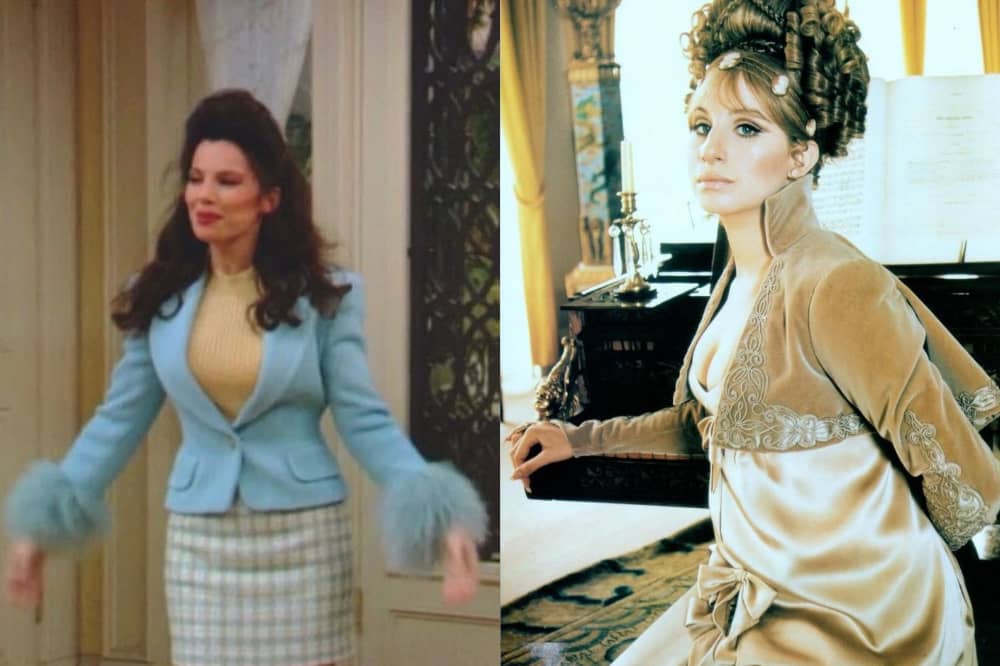
Fran Drescher has said Fran Fine was modeled after Barbra Streisand, not just in personality but in voice, attitude, and unapologetic glamour. Drescher described the project as creating a Jewish “Barbra in Queens” and deliberately channeled Streisand’s nasal accent, bold confidence, and warmth. Beyond just mimicry, Fran Fine’s style, tight designer outfits, over-the-top makeup, became a cultural touchstone reminiscent of Streisand’s own stage persona. Her confidence and Jewish identity, particularly in 1990s primetime TV, helped break stereotypes and influenced fashion trends (like today’s “Nanny-core”) for generations.
2. Frasier – the Orson Welles Echo
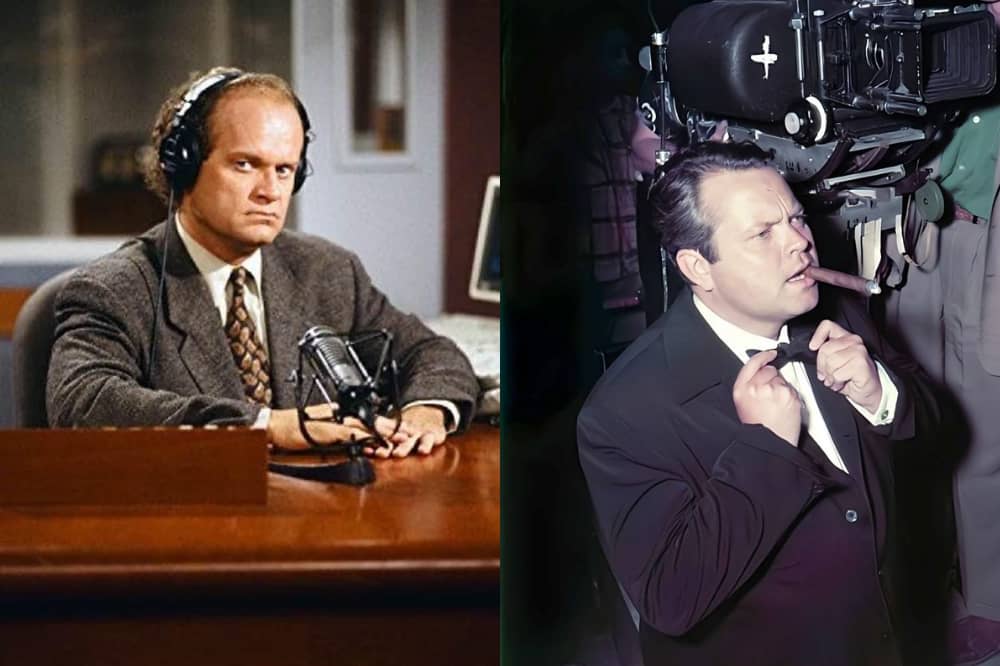
Kelsey Grammer shaped Frasier Crane around the persona of Orson Welles, his slow, dramatic cadences, patrician tone, love of opera and fine wine feel like a playful tribute. Fans on Reddit note that Frasier’s speech patterns often mirror Welles’ almost “carbon copy” fashion, from vocabulary to timing. This connection goes deeper than a vocal imitation. Frasier’s worldview, worldly, cultured, slightly aloof, echoes Welles’s public persona, and even storylines (like literary pretentiousness or dramatic monologues) carry a subtly Wellesian theatricality. Once you notice the similarity, it becomes hard to separate Crane from Welles’s shadow.
3. Murphy Brown – Channeling Real News Icons
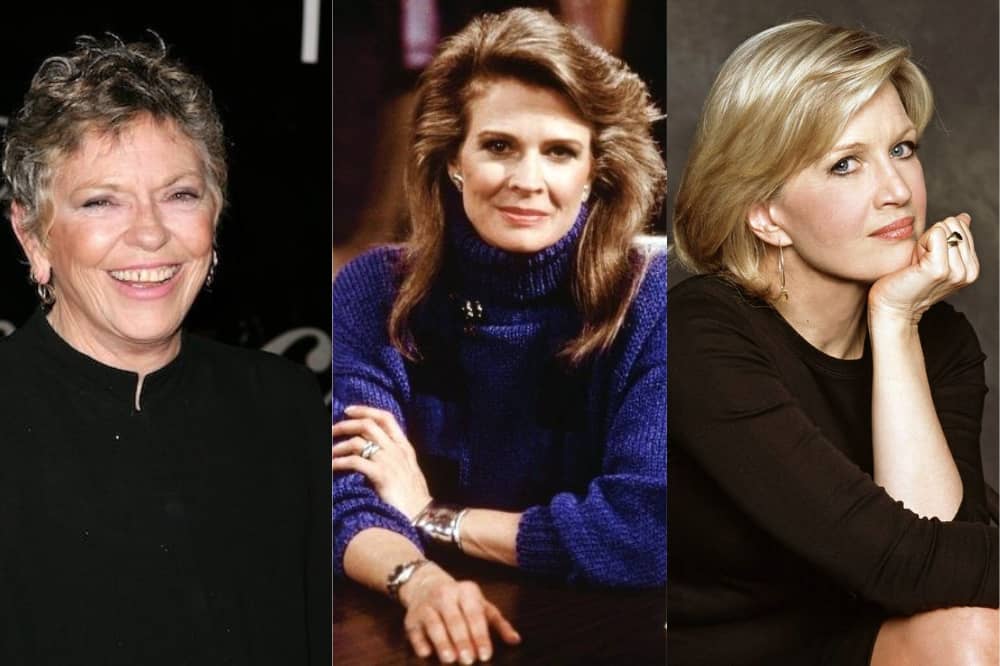
Candice Bergen’s Murphy Brown wasn’t conjured from thin air, she drew heavily on real broadcast reporters like Diane Sawyer and Linda Ellerbee. Murphy’s direct, opinionated, unapologetic style reflects the journalistic courage and voice of these trailblazers. The parallels extend to wardrobe, demeanor, and tone, Murphy’s newsroom authority and blunt wit hark back to Diane Sawyer’s measured commentary and Ellerbee’s sardonic honesty. The show also engaged with real-world politics (notably a 1992 presidential critique of single parenthood), showcasing how fictional characters could mirror cultural debates.
4. Maude – Inspired by Frances Lear
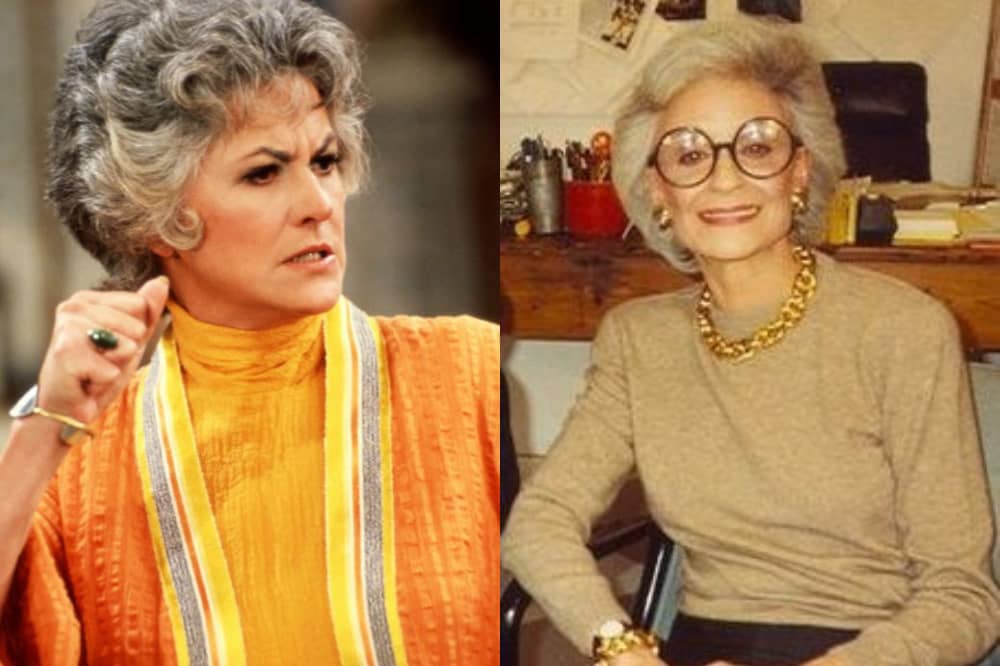
Creator Norman Lear based Maude Findlay in part on his then-wife, Frances Lear, a passionate, outspoken liberal feminist. Maude’s blunt political convictions, feminist values, and fiery presence reflect Frances’s temperament and beliefs. The show tackled groundbreaking social issues, especially the 1972 two‑part abortion storyline, that mirrored Frances’s own ideological strength. While CBS initially balked, Lear insisted, and the episodes aired, sparking protests and changing TV forever. Maude became a symbol of feminine agency, feminist representation, and creative independence.
5. The Larry Sanders Show – Late‑Night Icons Amplified
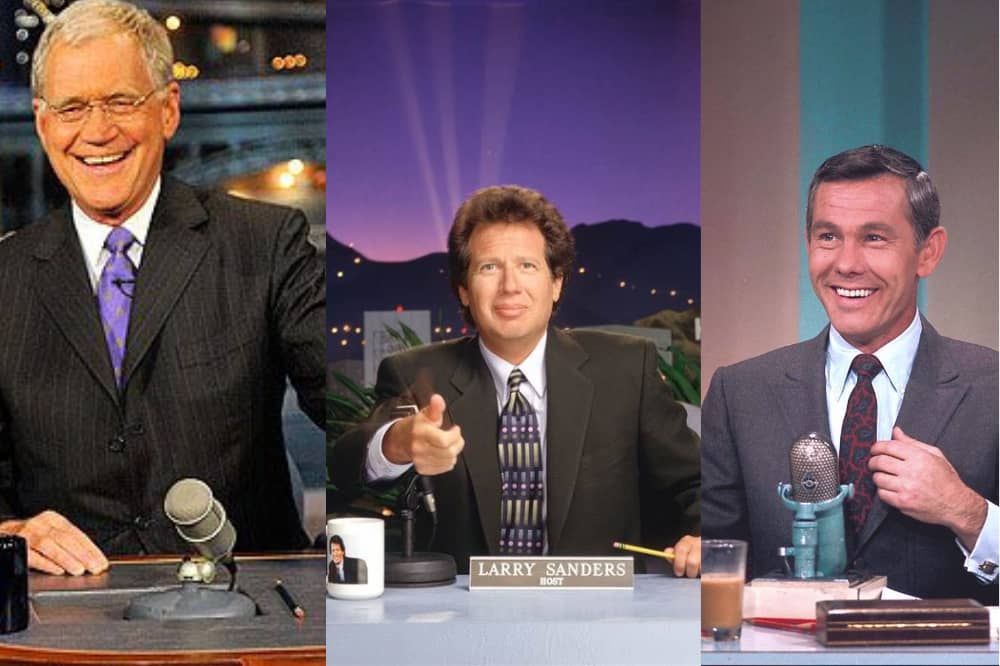
Garry Shandling’s neurotic, insecure talk‑show host Larry Sanders is a composite of real legends like Johnny Carson and David Letterman. Shandling famously turned down a typical late‑night host role to instead satirize and personify that world with an insider’s perspective. Episodes consistently peek behind the curtain, celebrity guests griping about the host, backstage insecurities, ego clashes, that draw directly from the backstage realities of familiar TV talk shows. The result: a revelatory comedy that merges real‑world dysfunction with fictional exaggeration in a smart, realistic narrative.
6. The Bernie Mac Show – Bernie Mac as Himself

Bernie Mac had already taken in his sister’s children in real life before turning that experience into a sitcom narrative. The show uses his real parenting journey, his blunt honesty, tough-love style, and wisecracking narration, to fuel its humor and heart. Narrating the show in second person, Bernie directly addresses viewers, blending autobiography with sitcom convention. By owning his real-life parenting struggles, he created a show that was comic, relatable, and uniquely authentic.
7. The Wonder Years – Neal Marlens’ Own Childhood
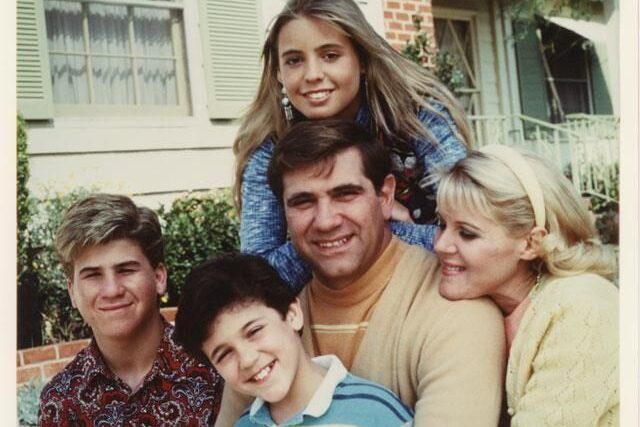
Co-creator Neal Marlens and his wife Carol Black based The Wonder Years on Marlens’ life growing up in 1960s Long Island, making the show essentially a dramatized memoir. Many episodes recreate specific family moments, even dialogue, directly from Marlens’ childhood, with the suburban environment and characters drawn from his own memories. Although ABC opted not to name the town, the authenticity of those experiences shines through. The warmth of family dinners, first loves, and cultural shifts aren’t just period details, they’re personal recollections. That lived-in realism helped the show earn Emmys, a Peabody Award, and enduring nostalgic appeal.
8. Seinfeld – George Was Larry David
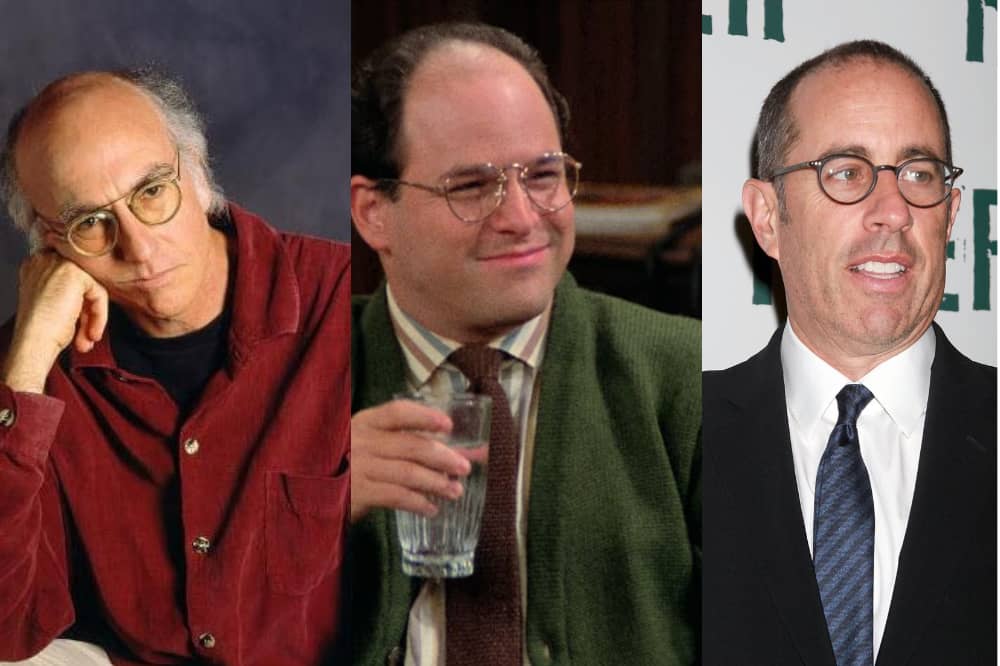
Though Jerry Seinfeld played a version of himself, George Costanza was essentially an on-screen Larry David. His neurotic traits, petty lies, social anxiety, sudden career changes, were lifted straight from David’s life (including quitting in a huff and latching onto ridiculous schemes). This transparent borrowing shaped Seinfeld’s unique comedic DNA: George’s fiasco-filled misadventures carry David’s real-life cringe moments, giving the sitcom its signature “show about nothing” authenticity. When viewers laugh at George, they’re really looking at Larry’s caricature, and that depth resonates even today.
9. Entourage – Mark Wahlberg’s Rise
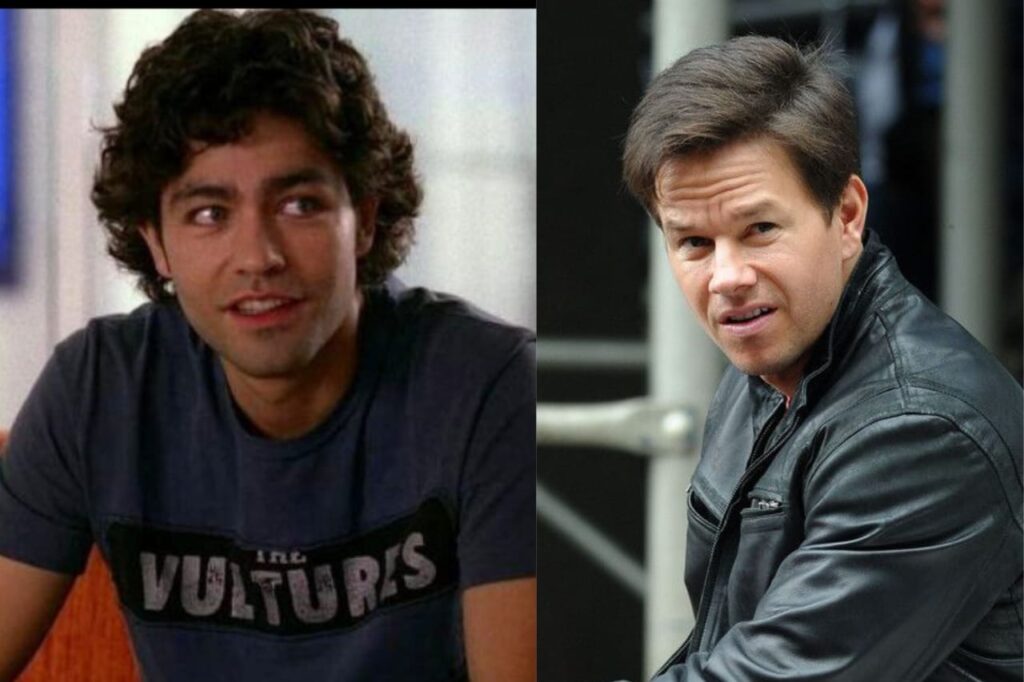
Entourage is a dramatized version of Mark Wahlberg’s own early career, with the fictional Vince Chase mirroring Wahlberg’s Hollywood journey. Wahlberg’s real-life pals inspired characters like Turtle and Johnny Drama, and he served as an executive producer to keep the story authentic (inferred Hollywood narrative). The show explores themes Wahlberg experienced: talent discovery, media frenzy, and navigating an entourage dynamic. It feels personal, less parody, more insider tale, which helped Entourage appeal to viewers curious about celebrity life behind the glitz.
10. Curb Your Enthusiasm – Larry David Unfiltered

Curb Your Enthusiasm doesn’t just draw from Larry David’s life, it’s built on it. Many plotlines mirror real scenarios from David’s life, arguments with waiters, social etiquette disasters, misunderstandings, drawn directly from his real experiences. Although dramatized and exaggerated, the scenarios often originate from David’s own history. The result is a sitcom that feels like a documentary lampoon: semi-scripted, semi-improvised, and deeply personal, offering an unfiltered peek into his worldview.
11. 30 Rock – Tina Fey & Lorne Michaels Duet
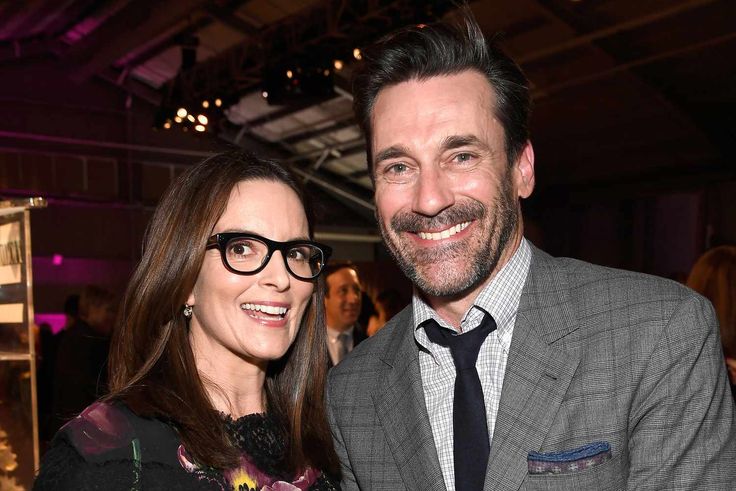
Liz Lemon is Tina Fey’s stand-in, a head writer managing a TV sketch show in New York, complete with self-doubt, coffee obsessions, and witty leadership, just like Fey during her time as SNL’s head writer . Fey herself has confirmed Liz shares her habits, struggles, and personal history. At the same time, Jack Donaghy is inspired by SNL boss Lorne Michaels. Alec Baldwin has said Donaghy mirrors Michaels’ perfectionist side and even his tuxedo-in-the-car vibes. The dynamic between Liz and Jack echoes the mentor-protégé relationship Fey had with Michaels. Together, these two characters embody real-world TV industry dynamics with hilarious precision.
This story 11 Sitcoms That Were Secretly About Famous People was first published on Daily FETCH


